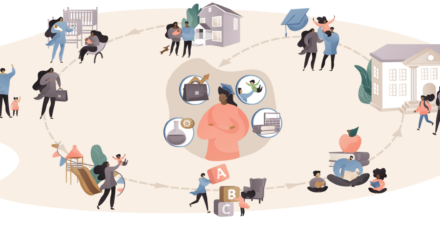Association for Public Policy Analysis and Management conference spotlights the value of diversity in U.S. policy analysis and research

Earlier this week, the Association for Public Policy Analysis and Management held its 2021 fall conference in Austin, Texas. The event, which was rescheduled late last year due to the coronavirus pandemic, is an annual multidisciplinary conference that brings together researchers and practitioners to present evidence and discuss ways to improve public policy.
APPAM’s theme for the conference this year was “The Power of Inclusion: Incorporating Diverse Voices in Public Policy Analysis and Management.” The goal was to demonstrate how more inclusive practices and added diversity in policy analysis and research add value to both processes and outcomes in these fields—an objective that is shared by Equitable Growth, which works to advance opportunities for scholars from underrepresented backgrounds and increase diversity in the economics field.
The APPAM conference was also an important avenue for Equitable Growth to expand our network of scholars from various disciplines and learn about cutting-edge research on income support programs, structural racism, and gender inequality in the U.S. labor market. We were especially excited to connect with scholars researching the care economy, particularly those focusing on child care and early education, as well as for those employed in this historically undervalued sector—two areas of research and policy that the coronavirus pandemic, recession, and so-called Great Resignation have put into stark relief.
Several of our grantees and other scholars in our network, as well as in-house experts, were featured in more than 12 sessions throughout the course of the APPAM event. Below, we detail their participation, organized by the session in which they took part.
- Paid Leave: A Policy to Ensure Inclusion in the Workplace: This panel session, organized by Equitable Growth grantee Meredith Slopen of Columbia University (who also presented funded research), focused on the role of paid leave in an inclusive and equitable economic recovery from the coronavirus pandemic and recession. Another grantee, Julia Goodman of Portland State University, presented her research (co-authored by Harvard University’s Daniel Schneider, also a grantee) on racial/ethnic and gender disparities in paid and unpaid leave-taking, and Equitable Growth’s Director of Family Economic Security Policy Alix Gould-Werth was a discussant.
- Understanding the Decline in Family Child Care Providers across Multiple States: This panel session sought to shed light on the factors contributing to the decline in family child care providers across multiple states in order to inform policy solutions that can better support these providers. Equitable Growth grantee Jonathan Borowsky of Boston University presented his funded research, co-authored by Washington University in St. Louis’ Hyun Soo Suh and Boston University’s Yoonsook Ha. Their paper looks at racial disparities in access to family child care centers through the lens of homeownership rates and racial divides in homeownership in the United States.
- The Gender Wage Gap: Factors Driving Its Evolution from Occupation to Policy to Pandemic: This panel session was organized by Equitable Growth grantee Tanya Byker of Middlebury College, who also presented funded research on the utilization of emergency paid sick and family leave amid the pandemic by gender and parenthood status. The session, which generally explored factors driving the evolution of gender pay disparities (including the pandemic), also featured presentations by grantee Marta Murray-Close of the U.S. Census Bureau of her work on estimating pay divides by gender using survey and administrative data, and by University of Utah’s Elena Patel, also a grantee, who discussed her paper the female labor supply effects of health insurance for women following childbirth. Patel and Murray-Close also served as discussants in the session.
- How Do Social and Policy Contexts Impact Parental Employment, Economic Circumstances, and Parental Investments?: This panel session considered how changes in employment hours and schedules impact parental involvement in child development, how these changes are influenced by and affect parenthood, and what role social infrastructure programs play in parental employment and child development. It featured a presentation of research done by Equitable Growth grantee Heather D. Hill and her co-author Elizabeth Pelletier, both of the University of Washington, on parental employment trajectories and patterns in the use of social infrastructure programs, such as Unemployment Insurance, around the birth of a child to map the overall prevalence of employment instability for new parents.
- Analyzing the Heterogeneous Effects of Local Labor Market Regulations on Employers and Low-Wage Workers: Chaired by Equitable Growth grantee Scott Allard of the University of Washington, this panel session assessed how and why local labor market regulations have different consequences for different industrial sectors, demographic groups, and groups of low-wage workers. Grantee Daniel Schneider also presented his work with fellow grantee Kristen Harknett of the University of California, San Francisco on the potential spillover effects of state and local paid sick leave mandates.
- “We’re Not Even on the Radar”: Participant Knowledge of Social Policies: This panel session, organized by Equitable Growth grantee Hilary Wething of Pennsylvania State University and chaired by grantee Heather Hill at the University of Washington, focused on the challenges of informing individuals about changes to social policies that affect them. Wething presented research co-authored by Hill on the learning and compliance costs that labor regulations place on workers, looking at the minimum wage in Seattle in particular. Grantee Hana Shepherd at Rutgers University detailed funded research with her colleague and fellow grantee Janice Fine, on city-level labor law enforcement agencies and their outreach practices to inform workers about relevant employment protections. Grantee Julia M. Goodman at Oregon State University also discussed her co-authored research on the impact of paid parental leave policies on women’s health outcomes and disparities by studying access to leave by sector and occupational class in San Francisco.
- Bureaucratic Encounters with Public Benefit, Child Care and Tax Programs: Reducing Administrative Burden in the COVID-19 Era: Chaired by Equitable Growth grantee Meredith Slopen, and organized by fellow grantee Julia Henly of the University of Chicago, this panel session sought to address the bureaucracy and administrative burden of eligibility requirements and application processes for government programs. Henly presented her co-authored paper on reducing these burdens amid the COVID-19 era, particularly with regard to child care providers seeking support through pandemic stimulus programs. Fellow Equitable Growth grantee Derek Wu detailed his funded research on the short- and long-term effects of cuts to programs—such as the Supplemental Nutrition Assistance Program, Medicaid, and the Temporary Assistance for Needy Families program—on family well-being during recessions. Grantee Jennifer Romich of the University of Washington also provided discussant remarks.
- Addressing Open Questions in the School Spending Literature: Existing Evidence, Diminishing Returns, and Positive Externalities: This panel session examined several aspects of school spending on elementary and secondary public education and its impact on student outcomes, from educational attainment to criminal activity and labor market outcomes later in life. Equitable Growth grantee and Research Advisory Board member Jesse Rothstein of the University of California, Berkeley presented his paper, co-authored with fellow grantee Diane Whitmore Schanzenbach of Northwestern University, on educational attainment and labor market outcomes of students by race and gender in the aftermath of school finance reforms in the early 1990s.
- What Has Happened to the American Working Class Since the Great Recession?: This roundtable, organized by grantee Timothy Smeeding of the University of Wisconsin-Madison, discussed how people of color have fared since the Great Recession of 2007–2009. Specifically, the session looked at labor market outcomes, wealth and income status, and material well-being for three distinct groups of U.S. workers: foreign- and U.S.-born Latino workers, Black workers, and American Indian, Alaska Native, Native Hawaiian, and Pacific Islander workers. Grantee Jennifer Romich at the University of Washington was a speaker at the roundtable, among others.






